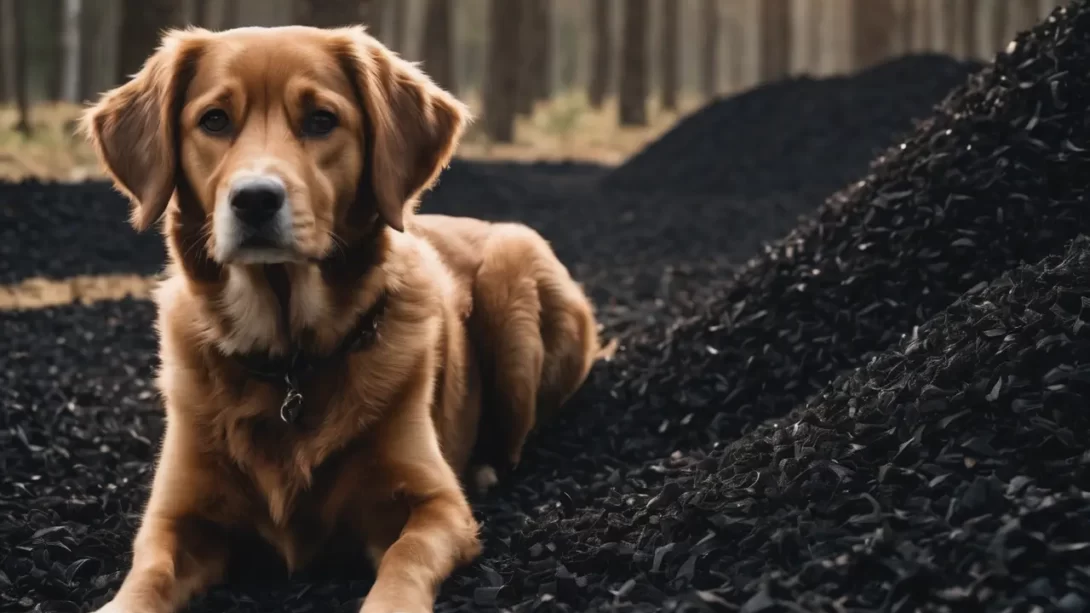Gardening and pet care often overlap, especially when it comes to choosing safe materials for our outdoor spaces. A common question among dog owners is whether black mulch is safe for their furry friends. Black mulch, known for its striking color and benefits to soil and plant health, is a popular choice in gardens. This article delves into the safety aspects of black mulch when it comes to dogs, aiming to provide clear and helpful guidance for pet-friendly gardening practices.
Mulch
Mulch is a layer of material applied to the surface of soil, with varieties ranging from organic materials like wood chips and straw to inorganic options like rubber or gravel. Black mulch, in particular, is favored for its aesthetic appeal and ability to retain soil moisture and regulate temperature. It’s typically made from hardwood or recycled wood products and is dyed black using various methods. Understanding the different types of mulch and their purposes is key to making informed choices for a garden that is both beautiful and safe for pets.
Concerns for Dogs
When it comes to pets, not all mulch is created equal. Dogs, with their curious nature and tendency to chew or ingest garden materials, can face risks from certain types of mulch. Black mulch poses specific concerns due to its composition and the chemicals used in its coloring process. These concerns range from gastrointestinal blockages due to ingestion of large pieces to potential toxicity from chemicals in the dye. It’s important for dog owners to be aware of these risks when choosing mulch for their gardens.
Black Mulch Composition
The primary concern with black mulch in dog-friendly yards centers around its composition. Most black mulch is made from hardwood or softwood chips, which are then dyed black. The dye used is typically a carbon-based or iron-oxide pigment, considered to be safe for use in landscaping. However, the safety can depend on the specific chemicals and processes used by the manufacturer. Some cheaper or lower-quality mulches may use harmful chemicals in their dyes, which raises potential health concerns if ingested by dogs.
Potential Hazards
The hazards of black mulch for dogs can be categorized into two main types: physical and chemical. Physically, chunks of wood can pose a choking hazard or cause intestinal blockage if ingested. This is a risk with any type of large-particulate mulch, not just black mulch. Chemically, the concern lies in the dye and any additional chemicals that might be present. While most dyes are labeled safe, there’s always a risk, albeit small, of toxicity or allergic reactions. Additionally, if the wood used in the mulch is treated or contains remnants of harmful substances, it could pose a further risk.
Preventive Measures
For dog owners who wish to use black mulch, there are preventive measures to consider. Choosing high-quality, pet-safe black mulch is crucial. Look for products that are specifically labeled as non-toxic or safe for pets. Creating barriers or designated no-dog zones can help keep pets away from mulched areas. Also, training dogs to avoid certain areas or not to chew on garden materials can be effective. Regular monitoring of the condition of the mulch is important too, as over time, it can break down or reveal hidden hazards.
First Aid and Response
In the event that a dog ingests black mulch, it’s crucial to act promptly. The first step is to assess the amount ingested and the dog’s behavior. If the dog shows signs of choking, difficulty breathing, or gastrointestinal distress, immediate veterinary attention is required. For minor cases, where the dog appears normal but has ingested a small amount of mulch, close monitoring for any signs of discomfort or illness is advised. It’s always better to err on the side of caution and consult with a veterinarian if there are any doubts or concerns about the dog’s health after ingestion.
Expert Opinions
Veterinarians and pet experts often emphasize caution when using dyed mulches in gardens accessible to pets. While most agree that the risk of toxicity from the dye is low, they advise against taking unnecessary risks. The consensus is to opt for pet-safe, non-toxic options, especially in areas where dogs have free access. Regular check-ups and discussions with a vet about the garden environment can help in maintaining the health and safety of pets.
Conclusion
In summary, while black mulch adds aesthetic value to gardens, its safety for dogs is a valid concern. The risks, though generally low, depend on the quality of the mulch and its chemical composition. For dog owners, the key is to select high-quality, pet-safe black mulch, implement preventive measures, and monitor their pets’ interaction with mulched areas. By taking these precautions, gardeners can enjoy the benefits of black mulch while keeping their canine companions safe and healthy. Ultimately, the well-being of pets should always be a top priority in garden planning and maintenance.




